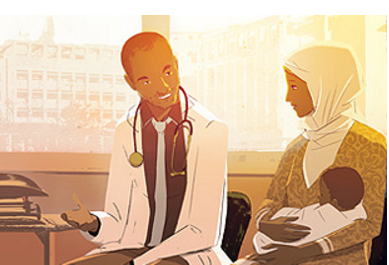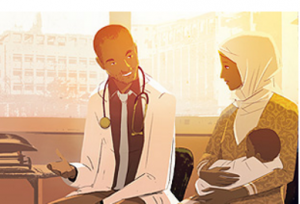
It is only recently that mental health has found its place on the international ‘Global Health’ agenda as one of the five most important Non Communicable Diseases. [1] Mental ill-health is responsible for more disability than tuberculosis, malaria, cancer, ischaemic heart disease, and stroke; promoting mental health and wellbeing is written into SDG 3.4; mental health appeared clearly in the Political Declaration on Universal Health Coverage from some years ago.
Mental illness is not a disease like other diseases. It is not binary (we are all on a sliding scale), and it does not know simple interventions that just need to be scaled up. Moreover, ‘mental health’ is an amalgam of various things that have completely different causes, and are very different in their appearance.[2] The spectrum ranges from neurobiological disorders to non-individual, situation-related conditions and culture-bound expressions of social suffering that are understood differently in different socio-cultural contexts. There is much to be done to clarify the field, from emergency response for people who find themselves in traumatizing situations to a sustainable approach for patients with severe mental illness.
Several Be-cause health member organisations and partners work on mental health programmes in developing countries, exchange practices and findings and aim to obtain more buy-in from fellow practitioners and policy makers. Be-cause health provides a forum to share field experiences and research on the topic.
[1] Arthur Kleinman, Georgia Lockwood Estrin, Shamaila Usmani, Dan Chisholm, Patricio V Marquez, Tim G Evans, Shekhar Saxena (2016) Time for Mental Health to come out of the shadows. www.thelancet.com Vol 387 June 4, 2016
[2] Ashok Malla, Ridha Joober, Amparo Garcia (2015) Mental illness is like any other medical illness: a critical examination of the statement and its impact on patient care and society. J Psychiatry Neurosci 2015;40(3)
 MORE
MORE
past events

Reference documents
- mhGAP Intervention Guide for mental, neurological and substance-use disorders in non-specialized health settings
- Health Advisory Group, Nov. 2015 report: "Improving mental healthcare in resource-poor settings"
- Health Advisory Service_N°25_Mental Health Care
- ODI Mental health funding and SDGs
- WHO report on suicide 2014_eng
- WHO report 2001 on Mental Health_en
Tools
- Kick-off meeting 1 February: presentation
- Case study - Presentation by Abdoulaye Sow (Fraternité Médicale Guinée, ESPULB/ITM) on "Integration of mental health services at the first line in Guinée-Conakry" during Be-cause health 2015
- Case study – presentation by Sébastien Theunissen (UCL – Cliniques universitaires Saint-Luc): Mental health – Cambodia (2015)
external links
- Prime programme improving mental healthcare
- Out of the shadows: making mental health a global development priority
- EU-Compass for Action on Mental Health and Well-being
- World Health Organization : recent publications on Mental Health
- WHO campaign - "Depression: let’s talk"


